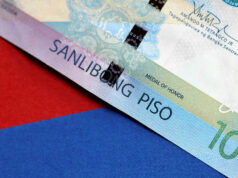Service quality cited as bright spot in PHL governance — NEDA
THE Philippines regressed in three of six categories in the World Governance Indicators, with “Government Effectiveness” the standout area of improvement, a performance which Socioeconomic Planning Secretary Ernesto M. Pernia attributed to the streamlining of government services.
The Government Effectiveness score jumped to the 55th percentile (55.29) from 51.92 two years earlier. However, the performance failed to meet the target of 59 set out in the Philippine Development Plan 2017-2022.
Mr. Pernia also highlighted the Philippines’ performance in the WGI’s “Regulatory Quality” category to the 56th percentile (56.73) in 2018 from 55.77 in 2017, which he said beat the target of 54 set in the PDP.
In a statement released by the National Economic Development Authority (NEDA), he said the improved standing reflects upgrades to the government’s internal efficiency in the government.
The NEDA statement made no mention of the Philippines’ worst category, “Political Stability and Absence of Violence,” where the country’s percentile standing actually improved to 12.86 in 2018, from 11.43 two years earlier.
WGI defines the category as measuring “perceptions of the likelihood of political instability and/or politically-motivated violence, including terrorism.”
“The government will address shortcomings in other governance indicators by expanding inter-agency initiatives and engaging citizens to reduce corruption. Also, strengthening local development councils to ensure participation of civil society organizations, and addressing fragmentation in the justice system to ensure swift and fair administration of justice,” Mr. Pernia was quoted as saying.
The categories where the Philippines posted declines were: “Voice and Accountability, 47.78 from 48.77 in 2017, “Control of Corruption,” 34.13 from 39.42, and “Rule of Law,” 34.13 from 37.02.
Voice and Accountability refers to perceptions that citizens can participate in selecting the government and enjoy freedom of expression and association, as well as a free media.
The WGI considers more than 200 countries in its study and draws from about 30 datasets.
“More than the passage of the Ease of Doing Business and Efficient Government Service Delivery Act of 2018, it has been government agencies themselves that made the difference in complying with these measures to make their services efficient,” Mr. Pernia added.
He cited a NEDA study where individuals and businesses expressed greater satisfaction with government frontline services since the implementation of Republic Act (RA) No. 9485 or the Anti-Red Tape Act (ARTA) of 2007.
He also cited the impact of reforms like the Citizen’s Charter, the no-noon-break policy in government offices, and department-level innovations in service delivery, including the use of automated queuing systems.
RA 11032 or the Ease of Doing Business and Efficient Government Service Delivery Act of 2018 also requires agencies to speed up processing time and simplify procedures in government transactions.
The regional WGI leader was Singapore, with performances in the high-90s percentile in five of the six categories, including a 100 score in Government Effectiveness. Its weakest performance was in Voice and Accountability at 41.87.
The ASEAN Averages were 27.93 in Voice and Accountability, 48.05 in Political Stability and Absence of Violence, 57.21 in Government Effectiveness, 45.62 in Control of Corruption, and 52.79 in Regulatory Quality. The Philippines beat the ASEAN average in two categories, Voice and Accountability and Regulatory Quality. — Beatrice M. Laforga



